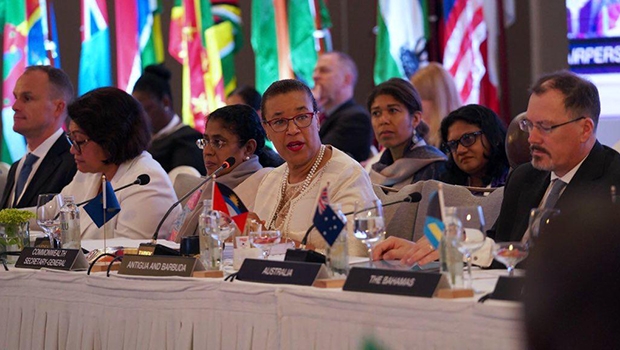
Commonwealth law ministers have unanimously resolved to remove barriers to access to justice in their respective countries, and to deliver Sustainable Development Goal 16 on peace, justice and strong institutions by 2030.
The biennial Commonwealth Law Ministers Meeting concluded today with a set of proposed actions to be taken at the national and Commonwealth level.
Ministers agreed to address the justice needs of vulnerable persons, including by expanding specialised justice services and targeting root causes of legal problems.
Commonwealth Secretary-General Patricia Scotland said: “The Commonwealth Law Ministers Meeting is a powerful platform for mutual support and collaborative action to help all our member countries deliver on the values of our Commonwealth Charter, and towards achieving the Sustainable Development Goals.
“The active circulation of ideas and solutions amongst such a diverse group of nations, and the resultant outcomes, are all testament to the value of the Commonwealth and its networks in supporting good governance and the rule of law.”
Minister of Justice and Prison Reforms of Sri Lanka Hon Thalatha Atukorale, who chaired the sessions, said: “Equal access to justice is integral to achieving the Sustainable Development Goals, and fundamental to defending human rights and democracy.
“However, new challenges require a trans-national and trans-institutional effort with international coordinated action. In this context, the Commonwealth is one of the most suitable platforms to work together on the same mission.”
Innovations in access to justice
Ministers considered a major study on international commercial arbitration in the Commonwealth. They agreed this method of resolving cross-border disputes could be especially helpful for small and medium-sized enterprises.
Countries were encouraged to consider signing the New York Convention on international commercial arbitration and adopt compatible national laws.
Ministers also welcomed a package of anti-corruption benchmarks, drafted by the Secretariat, designed to help governments and public sector bodies measure their anti-corruption activities, and make improvements if needed.
The benchmarks cover 25 areas, including corruption offences and public procurement. They will be submitted for final approval to Commonwealth Heads of Government at their biennial meeting in June 2020.
Ministers debated the transformative impact of technology in the delivery of justice, including ethical considerations. They agreed to explore the creation of Commonwealth guidelines on the use of artificial intelligence in the legal sphere.
Countries agreed to support each other in adopting new technologies to ensure timely, convenient and equal access to justice, in a low-cost and people-friendly manner.
Finally, ministers called for a study on restorative justice in the Commonwealth – reconciling offender, victim and community to resolve disputes – taking note of indigenous, traditional and customary justice systems. The findings may be developed into Commonwealth good practices on the issue.
They commended the legal work of the Secretariat, including on virtual currencies, legislative drafting and cyber issues.
The outcomes of the law ministers meeting will be tabled at the Commonwealth Heads of Government at their next meeting in Rwanda, in June 2020.




























